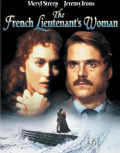
Directed by
Karel Reisz
124 minutes
Rated PG
Reviewed by
Bernard Hemingway


The French Lieutenant's Woman
The French Lieutenant's Woman opens very effectively on what appears to be the quay of a Victorian era fishing village, the camera pulling away to reveal a film crew and Meryl Streep about to shoot a scene in which as John Fowles’ titular heroine she hurries along The Cobb, a winding sea wall where she will gaze out to France amidst the rain and sea spray. It is a marvellously economical device which announces that we are about to see a make-believe world unfold before our eyes. What is arguably less marvellous is that the device is amplified into a parallel story of Anna (Streep) and Mike (Jeremy Irons), the actors playing Sarah and Charles in the main narrative. I say "arguably" although it is hard imagine that anyone would regard the periodic intrusions of 1980s pastel-hued mundanity into the splendid recreation of mid-Victorian England as a good thing.
In the latter setting Irons plays Charles Smithson, an upper-class bachelor of independent means who is engaged to Ernestina Freeman (Lynsey Baxter), the daughter of a rich mercantilist. Whilst visiting his fiancée in the seaside retreat town of Lyme Regis he encounter the infamous "French lieutenant's woman", a governess who has scandalized the town with her affair with a married soldier who then deserted her. Charles, of course, falls in love with her and from thence his ordered, privileged world goes to pieces. Paralleling this we follow the affair of the lead actors, Mike and Anna, who are both married.
Fowles's best-selling book was written in the style of a novel by Thomas Hardy with its careful dissection of the mores of Victorian society which here, as the Industrial Revolution proceeds apace and Darwin’s theory of evolution begins to gain purchase, are on the cusp of change. One hundred years later, however , Fowles’s post-modern take on the form adopted a self-aware approach examining the conventions of characterization and plotting and Victorian culture from a 20th century perspective. In Harold Pinter’s adaptation this gets reduced to parallel narratives in which the actors’ relationship starts to reflect that of the characters they are playing although they never appear to be aware of it and which frankly is never particularly convincing or interesting, even if some of the “behind-the-scenes” sections are worthy of a Truffaut.
Streep, needless to say is wonderful although her accent is a bit of a mystery (Sarah at one points says she was born in Dorchester but Streep sounds as if she arrived in Dorset via Poland). Irons, of course, is very comfortable playing the proper English gentleman and the supporting cast are all excellent with Patience Collier outstanding as Sarah’s cruelly pious employer, Mrs. Poulteney.
But whilst the performances are first class if there is one thing that make Reisz’s film so compelling is its extraordinary recreation of Victorian England. Assheton Gorton’s production design, Freddie Francis’s cinematography, the art direction, wardrobe design and set decoration combined create a flawless simulacrum of the time and place with a visual style that in places recalls pre-Raphaelite paintings. Interfering with this for the sake of a passing acknowledgement of Fowles's literary technique seems, at best, perverse.
FYI: The TV version of the film eliminated 30 minutes of the modern scenes
Want something different?





